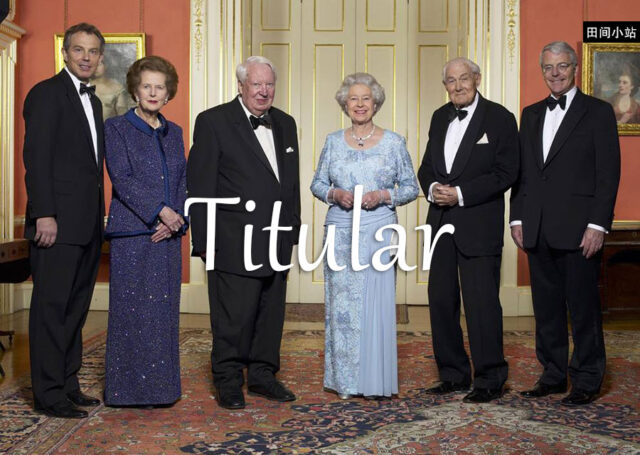本文经授权转载自微信公众号:田间小站

SAT GRE
外刊例句
- IN AN EPISODE of “The Sopranos”, a popular television series which started airing in the 1990s, a gangster tells Tony, from the titular family, that he wants to retire.
在1990年代首播的热剧《黑道家族》的一集里,一个黑帮分子对该家族的老大托尼说自己想退休了。
——《经济学人》 - Ron DeSantis, the titular head of the party and a candidate for president, said twice that Mr. Ziegler should step down.
该党名义上的党首、总统候选人罗恩·德桑蒂斯曾两次表示齐格勒先生应该下台。
——《纽约时报》
基本释义
[adjective] holding or constituting a purely formal position or title without any real authority
[形容词] 没有任何实际权力而担任或构成纯粹形式上的职位或头衔的
深入解读
从词源上来看, titular 是一个与熟词 title 同源的单词,两者都源自于拉丁语 titulus (铭文、标签、票证、标语牌、标题;尊贵称号、荣誉称号)。
其中, titulus +形容词后缀 -ar (有……性质的、属于……的、如……的)就发展出了法语 titulaire (正式的;有权拥有的、有权持有的),而后者最早于16世纪90年代进入英语后就演变出了 titular 。
该词因而最初也是用来表示“享有所有权的、有权拥有的”,比如有权拥有的财产(titular possessions),但现在更多的是用其引申指名义上拥有的,即“名义上的、有名无实的、徒具虚名的”,常作正式用语使用并仅用在名词前,常意味着担任或构成纯粹形式上的职位或头衔,一般享有与职位或头衔相关的荣誉,但没有任何实际职责、职能或权力。比如:
- 那个身着蓝色天鹅绒服装的女士是名义上的首脑,不过偶尔签字批准法律法规。
The lady clad in blue velvet is titular head, and merely signs laws occasionally.
此外, titular 还可以用来表示“标题的、书名的”以及戏剧、电影、小说中的人物“被用作标题、剧名、片名、书名的”,比如上面《经济学人》例句中的“the titular family”字面意思即“剧名家族”,也就指的是“the Soprano family”。
名人名言
You can have your titular recognition. I'll take the money and the power.
你可以拥有名义上的认可,而我将拿走金钱和权力。
出自《Cosmopolitan》杂志的前主编、 美剧《欲望都市》(Sex and the City)女主角原型海伦·格莉·布朗(Helen Gurley Brown)。
同近义词
- nominal: (of a role or status) existing in name only
- ceremonial: (of a post or role) conferring or involving only nominal authority or power
- token: done for the sake of appearances or as a symbolic gesture
